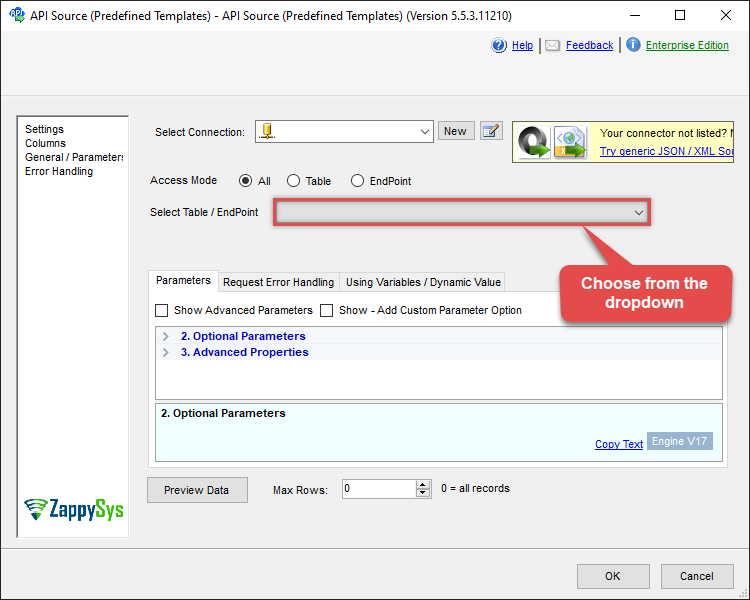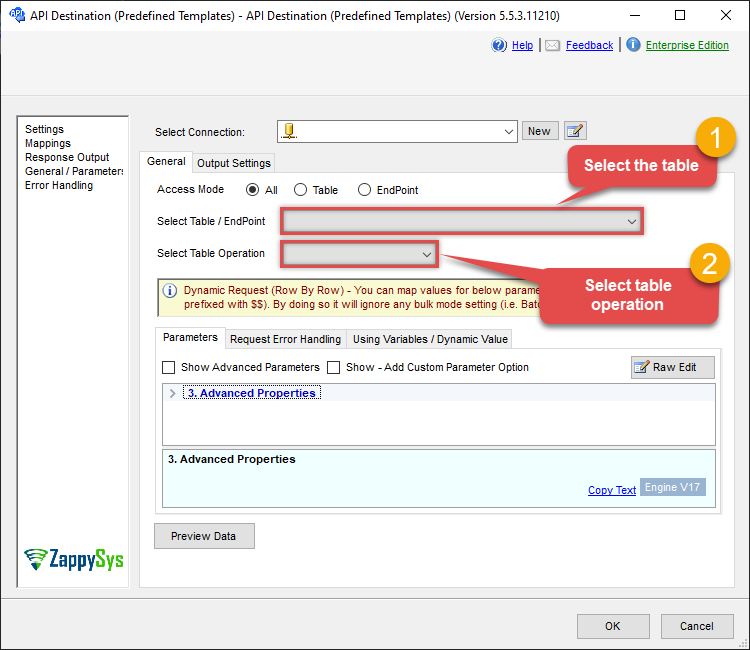Endpoint Get User Drives
Name
get_user_drives
Description
List all drives which are either shared with you (i.e. via shared files or folders) or you have full access to that drive. [API reference]
Related Tables
Parameters
| Parameter | Required | Options | ||||||||||
|---|---|---|---|---|---|---|---|---|---|---|---|---|
|
Name:
Label: Order By Order the specified column by ascending or descending order |
|
|||||||||||
|
Name:
Label: Search Criteria Data filter (e.g. somecolumn -eq 'somevalue') |
|
|||||||||||
|
Name:
Label: Page Size The number of records to include in each page of results |
Output Columns
| Label | Data Type (SSIS) | Data Type (SQL) | Length | Description |
|---|---|---|---|---|
| DriveId |
DT_WSTR
|
nvarchar(255)
|
255 | |
| DriveName |
DT_WSTR
|
nvarchar(255)
|
255 | |
| DriveType |
DT_WSTR
|
nvarchar(255)
|
255 | |
| Description |
DT_WSTR
|
nvarchar(500)
|
500 | |
| WebUrl |
DT_WSTR
|
nvarchar(500)
|
500 | |
| CreatedDateTime |
DT_DBTIMESTAMP
|
datetime
|
||
| LastModifiedDateTime |
DT_DBTIMESTAMP
|
datetime
|
||
| CreatedByByDisplayName |
DT_WSTR
|
nvarchar(500)
|
500 | |
| LastModifiedByDisplayName |
DT_WSTR
|
nvarchar(500)
|
500 | |
| LastModifiedByEmail |
DT_WSTR
|
nvarchar(500)
|
500 | |
| LastModifiedById |
DT_WSTR
|
nvarchar(500)
|
500 | |
| QuotaDeleted |
DT_I8
|
bigint
|
||
| QuotaRemaining |
DT_I8
|
bigint
|
||
| QuotaTotal |
DT_I8
|
bigint
|
||
| QuotaUsed |
DT_I8
|
bigint
|
||
| QuotaState |
DT_WSTR
|
nvarchar(50)
|
50 | |
| UserId |
DT_WSTR
|
nvarchar(255)
|
255 | |
| UserDisplayName |
DT_WSTR
|
nvarchar(500)
|
500 | |
| UserDescription |
DT_WSTR
|
nvarchar(4000)
|
4000 | |
| UserBusinessPhones |
DT_WSTR
|
nvarchar(4000)
|
4000 | |
| UserGivenName |
DT_WSTR
|
nvarchar(80)
|
80 | |
| UserJobTitle |
DT_WSTR
|
nvarchar(200)
|
200 | |
| UserMail |
DT_WSTR
|
nvarchar(200)
|
200 | |
| UserMobilePhone |
DT_WSTR
|
nvarchar(500)
|
500 | |
| UserOfficeLocation |
DT_WSTR
|
nvarchar(500)
|
500 | |
| UserPreferredLanguage |
DT_WSTR
|
nvarchar(100)
|
100 | |
| UserSurName |
DT_WSTR
|
nvarchar(80)
|
80 | |
| UserPrincipalName |
DT_WSTR
|
nvarchar(200)
|
200 | |
| UserCreatedDateTime |
DT_DBTIMESTAMP
|
datetime
|
||
| UserDeletedDateTime |
DT_DBTIMESTAMP
|
datetime
|
Input Columns
| Label | Data Type (SSIS) | Data Type (SQL) | Length | Description | |||||||||||||||||||||||||||||||||||||||||||||||||||||||||||||||||||||||||||||||||||||||||||||||
|---|---|---|---|---|---|---|---|---|---|---|---|---|---|---|---|---|---|---|---|---|---|---|---|---|---|---|---|---|---|---|---|---|---|---|---|---|---|---|---|---|---|---|---|---|---|---|---|---|---|---|---|---|---|---|---|---|---|---|---|---|---|---|---|---|---|---|---|---|---|---|---|---|---|---|---|---|---|---|---|---|---|---|---|---|---|---|---|---|---|---|---|---|---|---|---|---|---|---|---|
| There are no Static columns defined for this endpoint. This endpoint detects columns dynamically at runtime. | |||||||||||||||||||||||||||||||||||||||||||||||||||||||||||||||||||||||||||||||||||||||||||||||||||
Examples
SSIS
Use OneDrive Connector in API Source or in API Destination SSIS Data Flow components to read or write data.
API Source
This Endpoint belongs to the UserDrives table, therefore it is better to use it, instead of accessing the endpoint directly:
| Optional Parameters | |
|---|---|
| DataFormat | OData |

API Destination
This Endpoint belongs to the UserDrives table, therefore it is better to use it, instead of accessing the endpoint directly. Use this table and table-operation pair to get user drives:
| Optional Parameters | |
|---|---|
| DataFormat | OData |

ODBC application
Use these SQL queries in your ODBC application data source:
Get UserDrives
SELECT * FROM UserDrives
get_user_drives endpoint belongs to
UserDrives
table(s), and can therefore be used via those table(s).
SQL Server
Use these SQL queries in SQL Server after you create a data source in Data Gateway:
Get UserDrives
DECLARE @MyQuery NVARCHAR(MAX) = 'SELECT * FROM UserDrives';
EXEC (@MyQuery) AT [LS_TO_ONEDRIVE_IN_GATEWAY];
get_user_drives endpoint belongs to
UserDrives
table(s), and can therefore be used via those table(s).
